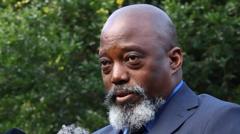In a move escalating political tensions, the DR Congo government has banned ex-President Joseph Kabila's party due to purported affiliations with the M23 rebels. This action coincides with Kabila's return to Goma after years abroad, as he faces accusations of treason and property seizure.
DR Congo Prohibits Former President's Party Amid Rising Tensions

DR Congo Prohibits Former President's Party Amid Rising Tensions
The government of the Democratic Republic of Congo has dismissed Joseph Kabila's political party over alleged connections to the M23 rebel group.
The Democratic Republic of Congo (DRC) has taken a significant step by banning the political party of former President Joseph Kabila, citing his alleged connection with the M23 rebel group. This announcement comes during a time of heightened instability, particularly in the eastern regions, where M23 has made considerable territorial gains this year.
Kabila, who governed the DRC for 18 years following the assassination of his father Laurent Kabila, has recently returned to the country after a two-year stay in South Africa. Reports suggest he has arrived in Goma, a city currently under the control of M23, which is widely believed to be backed by Rwanda. Upon his return, the DRC's interior ministry issued a statement declaring that the activities of Kabila's PPRD party had been banned due to its ambiguous stance regarding M23's occupation of Congolese land.
Alongside the ban, the government has accused Kabila, now 53, of high treason and has initiated proceedings to seize his properties. Kabila has denied any involvement with the M23 rebels and has yet to respond directly to the government's accusations or confirm his return to Goma; although he indicated earlier this month that he would return to the DRC and has a national address planned.
The spokesperson for the M23 group did not confirm or deny Kabila's presence but stated that there would be no issue with him being in Goma. The political landscape has certainly evolved since Kabila's presidency, which ended in December 2016.
After a contentious election in 2018, Kabila handed over power to Félix Tshisekedi, amidst allegations of a pre-arranged deal excluding opposition leader Martin Fayulu from power—claims both Kabila and Tshisekedi refute. Relations between Kabila and Tshisekedi's parties have since deteriorated.
Kabila’s recent return is reportedly driven by a desire to address the ongoing institutional and security crises in DRC. Political analysts have suggested that the connection between Kabila and the rebel leadership, particularly with figures who served under his administration, raises concerns. Historical echoes of territorial conflict also linger, as Kabila’s father similarly rose to power in the late 1990s through eastern DRC.
As tension continues to rise and with the situation in the eastern provinces of DRC deteriorating, how Kabila navigates this political landscape and interacts with both government forces and the M23 may define the next chapter in the nation’s turbulent history.
Kabila, who governed the DRC for 18 years following the assassination of his father Laurent Kabila, has recently returned to the country after a two-year stay in South Africa. Reports suggest he has arrived in Goma, a city currently under the control of M23, which is widely believed to be backed by Rwanda. Upon his return, the DRC's interior ministry issued a statement declaring that the activities of Kabila's PPRD party had been banned due to its ambiguous stance regarding M23's occupation of Congolese land.
Alongside the ban, the government has accused Kabila, now 53, of high treason and has initiated proceedings to seize his properties. Kabila has denied any involvement with the M23 rebels and has yet to respond directly to the government's accusations or confirm his return to Goma; although he indicated earlier this month that he would return to the DRC and has a national address planned.
The spokesperson for the M23 group did not confirm or deny Kabila's presence but stated that there would be no issue with him being in Goma. The political landscape has certainly evolved since Kabila's presidency, which ended in December 2016.
After a contentious election in 2018, Kabila handed over power to Félix Tshisekedi, amidst allegations of a pre-arranged deal excluding opposition leader Martin Fayulu from power—claims both Kabila and Tshisekedi refute. Relations between Kabila and Tshisekedi's parties have since deteriorated.
Kabila’s recent return is reportedly driven by a desire to address the ongoing institutional and security crises in DRC. Political analysts have suggested that the connection between Kabila and the rebel leadership, particularly with figures who served under his administration, raises concerns. Historical echoes of territorial conflict also linger, as Kabila’s father similarly rose to power in the late 1990s through eastern DRC.
As tension continues to rise and with the situation in the eastern provinces of DRC deteriorating, how Kabila navigates this political landscape and interacts with both government forces and the M23 may define the next chapter in the nation’s turbulent history.




















